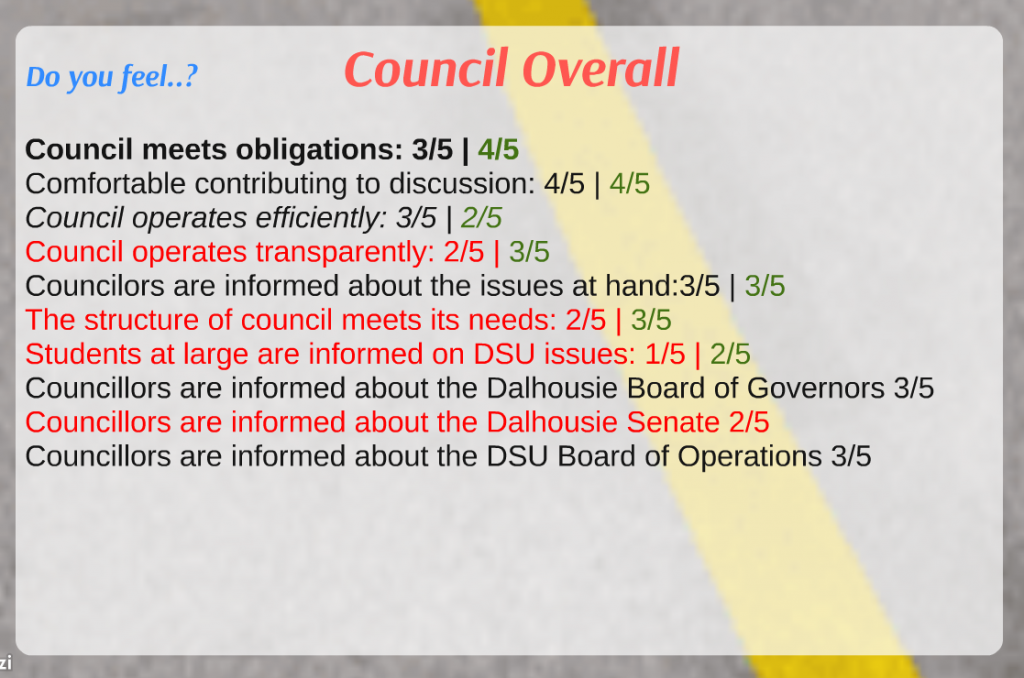
Councillors concerned at lack of communication, community among union
The Dec. 5 meeting of Dalhousie Student Union (DSU) council included a presentation on the fall 2014 report of the DSU’s Executive Review Committee (ERC).
The stated goal of the ERC is to conduct performance evaluations on DSU council as a whole, as well as on individual executive members.
Councillor Kaitlynne Lowe, Dalhousie Arts and Social Sciences Society (DASSS) president, is chair of the ERC. She presented on the report.
Lowe said at the meeting that “about half” of council had responded, as well as three students not on council. This would mean the survey included feedback from a total of approximately 25 people.
All members of the DSU were eligible to have input on the survey, but this opportunity was never advertised outside of the Gazette.
There was a period of approximately 42.5 hours between the deadline to submit a survey response and the presentation at council.
The presentation Lowe gave to council was based off a written report. The Gazette emailed Lowe asking for a copy of this report on Dec. 8, and we have not received a response.
The presentation given to council is embedded below. You can also watch Lowe give the presentation in the council meeting’s video recording.
DSU community weakened from previous years
“There is a small sense of community within the DSU, in certain sections,” said Lowe, “however it needs to be addressed to improve and create a community overall.”
“It seems that the feeling of a community has really been lacking in this semester, as opposed to other years.”
Lowe said one recommendation was that there “needs to be an extreme effort to promote the services the union has.”
Committee system questioned
The questions concerning committees of the DSU revealed respondents would like basic information about DSU committees to be public like minutes, contact information and the times and dates of meetings.
Respondents hoped for more non-councillor positions for DSU committees.
While some committees already have non-councillor positions available, these positions have not once been advertised by the DSU this semester. For example, the Elections Committee and Executive Review Committee have had spots open for general students this semester that were never mentioned outside of DSU council meetings.
These are committees that successful executive candidates in previous years have mentioned in their list of qualifications after serving a term on them, but the average student has had no opportunity to join them this semester.
Council’s overall performance decreases
All rankings for council decreased except for “Council operates efficiently”, which increased to 3/5 from 2/5. The report emphasized that the current structure of council needs to be re-thought.
“Students at large are still not very engaged with DSU issues,” said Lowe. “They might not even know we were talking about divestment tonight, which is sad.”
Overall executive performance decreases
All rankings of the DSU executive body as a whole either decreased or remained the same, with the overall performance level remaining at “Satisfactory.”
Notably, engagement with students at large remained at 2/5 from the last report, and communication with Carleton Campus remained at 1/5.
Communication from the executive to DSU council at large decreased from 3/5 to 2/5.
The report says the executive body’s problems include “lack of trust between each other, negative behavior, keeping secrets, intensely siloed, and lack of leadership.”
Lowe said the biggest issue for the executives is their lack of internal communication.
The report recommends the executive work together and have a plan for the union.
“A recommendation for that is to come together, make a series of plans for the next term, or goals,” said Lowe, “and present them to us in January so we can see how these councillors can help realize those goals, and work with the executive to ensure that is realized.”
Performance of each individual executive member decreases
The performance level of all individual DSU executive members decreased from the last time this report was conducted in September 2014.
DSU President Ramz Aziz decreased from “Excellent” to “Good”.
Vice President (Internal) Jennifer Nowoselski remained at “Good”, while Vice President (Academic and External) Jacqueline Skiptunis decreased from “Good” to “Needs Improvement/Satisfactory”.
During the meeting, Skiptunis joined Twitter.
Vice President (Finance and Operations) Mahbubur Rahman remained at “Good”, and so did Vice President (Student Life) Danny Shanahan.
Rahman joined Twitter the day after the meeting.
Shanahan was the only executive member to have any rankings increase, with his communications with Studley campus increasing to 4/5 from 3/5.
There seems to be no consistent basis for the rankings of “Satisfactory”, “Good”. A commenter on the Gazette‘s earlier story on this report noted that while both Aziz and Shanahan scored 20/30 in the summer report, Aziz was ranked “Excellent” while Shanahan was only “Good”.
Communications could improve
After Lowe’s 20-minute presentation repeatedly emphasized communications across council must approve, the floor was open to anyone who had comments or questions on the report.
William Coney, DASSS chair, asked from the audience how many respondents the Executive Review Survey had.
“I received three student reviews – not as many as I wanted, but the ERC is looking at taking the survey online, to hopefully reach out to as much students as possible,” said Lowe.
In some previous years, like 2003, the ERC surveys have been online.
A councillor asked if any of the students canvassed mentioned the potential benefits of having the DSU’s budget online.
“Yeah,” said Lowe. “Essentially, everyone was like – we wanna see as much as possible be online.”
The DSU’s complete budget – a budget completely upheld by membership fees of students who have no option to opt out – is currently not public. The DSU has said this is because it contains the salaries of certain staff members that would be illegal to publish.
Still, certain information about the DSU’s budget that could be public still isn’t published.
The salaries of DSU executive members are not posted anywhere on DSU.ca, but are available within the budget.
In a copy of the revised budget for 2014/15 that the Gazette has obtained, the Vice President (Student Life) is scheduled to make $34,739.79. The VP (Academic and External) is scheduled to make $35,665.21. The Vice President (Finance and Operations) is scheduled to make $37,923.65. The VP Internal is scheduled to make $37,539.81. The President is scheduled to make $35,095.47.
Council has not discussed this semester whether a budget with only certain staff salaries redacted could be published.
(Ed. note: the Gazette’s budget is currently not accessible online, either, but it could be published if there is interest. We can tell you now that the Gazette‘s staff in 2013-14, a cast that varied from 14 to 16 throughout the year, were paid a combined total of $54,625.)
There were no further questions. The next report of the ERC is not due until the end of the winter semester when, if the current schedule is followed and things don’t drastically change before March, DSU elections will have occurred.









